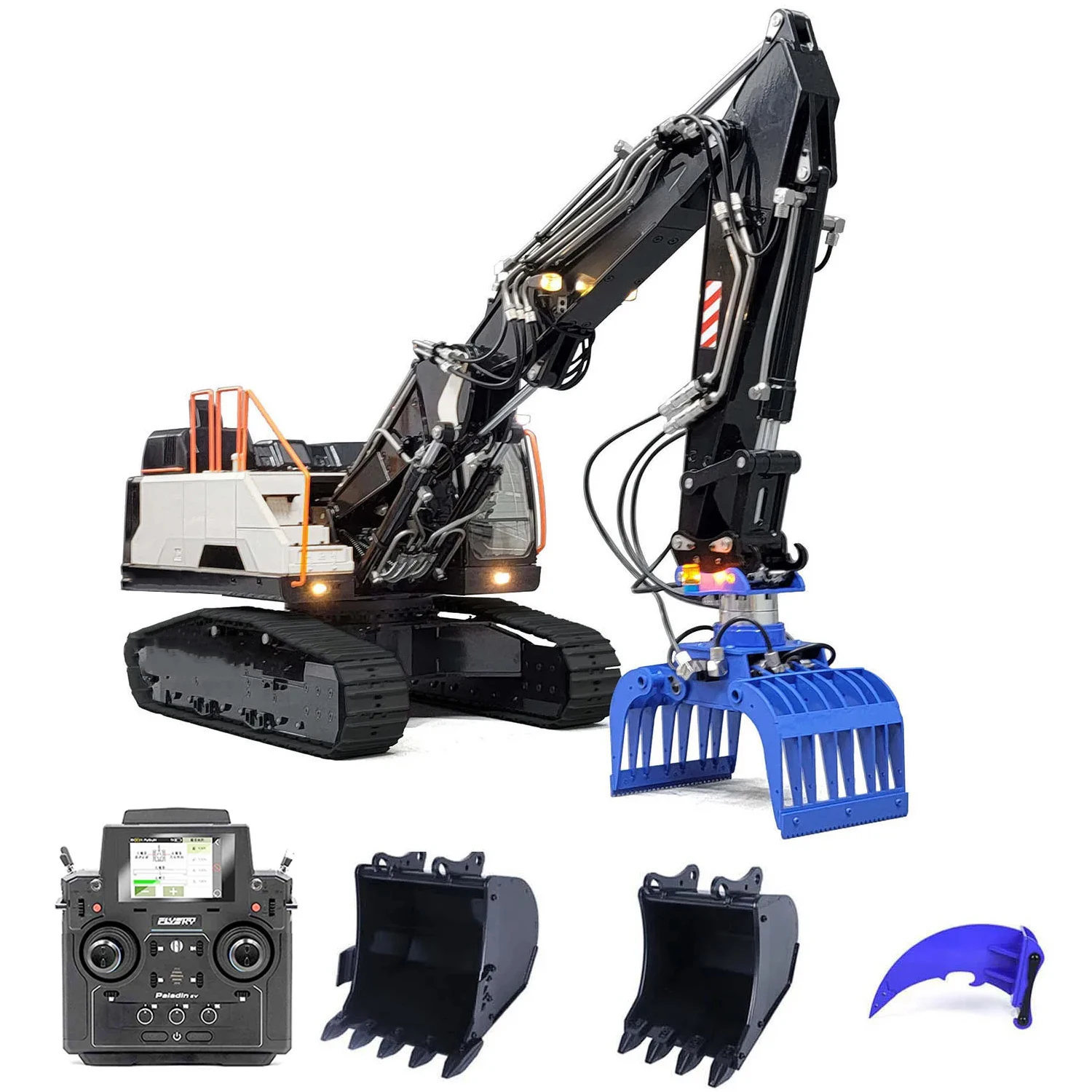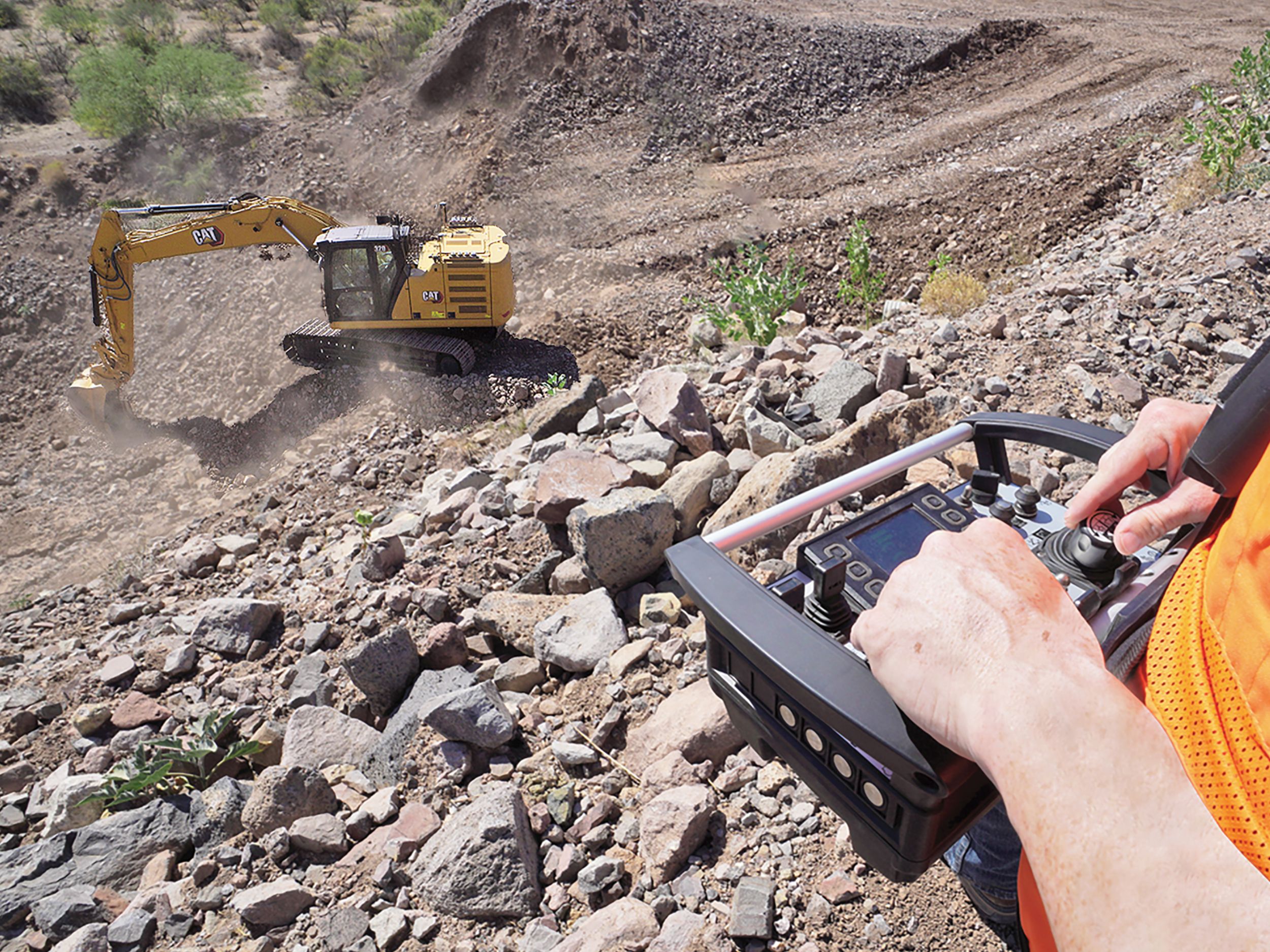Discover the Relevance of Excavator in Modern Building And Construction Projects
Excavators are vital devices in modern construction tasks. Their adaptability allows them to do a vast array of jobs, from digging and grading to demolition and site prep work. Advanced features, such as hydraulic accessories and general practitioners, enhance their capabilities and performance on job sites. As the market evolves, the value of excavators grows also extra. Comprehending their function can reveal insights into the future of building methods. What lies ahead for these equipments?
The Versatility of Excavators in Different Projects
Excavators are commonly associated with massive building and construction projects, their versatility permits them to be utilized in a broad variety of applications, from property landscape design to energy upkeep. In city setups, excavators can browse tight areas to dig structures for homes or install drainage systems. Their ability to execute delicate tasks makes them perfect for landscaping jobs, where they can dig deep into for ponds or plant trees. On top of that, excavators play a vital role in energy upkeep, efficiently digging trenches for pipes or wires without interfering with bordering locations. In agricultural applications, they assist in land clearing up and dirt prep work. Additionally, their versatility enables them to be geared up with various add-ons, improving their functionality throughout different tasks. This multifaceted nature of excavators not just improves numerous building and construction processes yet likewise demonstrates their essential duty in contemporary framework development and upkeep.
Secret Features and Sorts Of Excavators
The conversation on crucial features and kinds of excavators highlights the essential qualities that make these makers important in building. Numerous excavator types, each created for certain tasks, demonstrate their convenience and performance across different applications. rc excavator. Comprehending these functions and categories is essential for maximizing their usage in modern-day construction tasks
Excavator Keys In Overview
Excavators play a pivotal function in contemporary building and construction, offering convenience and efficiency throughout various jobs. These hefty equipment devices can be found in a number of types, each customized for specific applications. The most usual kinds include crawler excavators, recognized for their security on unequal surface, and wheeled excavators, which supply better mobility on smooth surfaces. Small excavators are favored for limited spaces and small-scale projects, while long-reach excavators are designed for deep digging. In addition, there are customized excavators, such as hydraulic excavators, which enhance power and precision. Each type features one-of-a-kind capabilities, making them necessary for jobs varying from digging and grading to demolition and material handling. Comprehending these variants enables construction professionals to pick the best excavator for their job requires.
Secret Features Explained
Recognizing the key features of excavators boosts their reliable application in construction tasks. Excavators are characterized by their powerful hydraulic systems, which provide the necessary force for digging, lifting, and moving materials. Their expressed arms permit a wide variety of motion, assisting in specific procedures in constrained areas. In addition, the variety of add-ons, such as pails, grapples, and augers, increases their convenience to satisfy various task needs. The dimension and weight of excavators also add to their security and ability to move on different terrains. Developments in technology have actually led to the assimilation of GPS and automation, improving precision and performance in excavation jobs. These functions collectively place excavators as vital devices in contemporary building and construction.
Applications in Building and construction
Changing construction sites, excavators play an essential role throughout different applications, varying from domestic structure jobs to large-scale infrastructure growths. These functional machines are equipped for jobs such as digging foundations, trenching for energies, and site grading. Various kinds of excavators, including crawler, rolled, and mini excavators, give details advantages tailored to the job demands. Spider excavators master rough terrains, while rolled excavators supply mobility on paved surface areas. Mini excavators are optimal for confined spaces, making them prominent in urban setups. The effectiveness and power of excavators considerably accelerate construction processes, making certain timely task conclusion. Their adaptability further improves their importance, allowing construction groups to tackle a diverse variety of difficulties effectively.
Enhancing Performance and Efficiency on Job Sites
Making best use of performance and performance on task websites is an important objective in modern-day building. Excavators play an essential function in attaining this goal by simplifying various jobs. Their capacity to do multiple functions-- such as grading, digging, and lifting-- decreases the requirement for additional tools, thus saving time and resources.Moreover, excavators boost operations by permitting faster conclusion of jobs. With advanced attributes like hydraulic attachments and general practitioners innovation, they can execute precise procedures that reduce mistakes and revamp. This precision not only boosts the high quality of job but additionally optimizes product usage, contributing to cost savings.The versatility of excavators permits them to adjust to various site conditions, making sure that projects advance smoothly despite challenges. By integrating excavators into building and construction procedures, teams can substantially improve their general performance, resulting in prompt job completion and increased profitability.
Safety And Security Benefits of Using Excavators
Excavators greatly improve safety on building and construction sites via improved operator visibility and reduced manual work threats. By offering operators with a clear sight of their environments, excavators help to stop crashes and injuries. Furthermore, the equipment reduces the need for employees to participate in hazardous hand-operated click here for info tasks, even more advertising a much safer work setting.
Boosted Driver Exposure
Although building and construction websites can be chaotic and loaded with potential dangers, improved operator presence plays an important function in guaranteeing safety when using excavators. Modern excavators are made with huge, unobstructed home windows and strategically positioned mirrors, permitting operators to keep a clear sight of their environments (rc excavator). This enhanced visibility is vital for finding pedestrians, various other machinery, and different challenges, significantly decreasing the threat of accidents. Additionally, many excavators include sophisticated technology, such as video cameras and sensors, to provide drivers with additional viewpoints, even more improving awareness. The capacity to see more plainly not only help in effective operation but additionally fosters a more secure work atmosphere, making it easier for operators to browse intricate building sites without endangering security criteria
Minimized Handbook Labor Threats
When hand-operated labor is reduced via the use of excavators, various safety and security benefits arise, noticeably enhancing the well-being of building employees. Excavators reduce the physical stress linked with heavy training and recurring jobs, effectively reducing the risk of bone and joint injuries. By automating processes such as digging, grading, and moving materials, they permit workers to keep a safer range from potential dangers. Additionally, excavators are equipped with advanced safety features, such as rollover protection systems and enhanced operator functional designs, which better safeguard personnel on site. The result is a considerable decrease in office crashes and injuries, bring about increased performance and morale among construction groups. Ultimately, the adoption of excavators adds to a much safer and a lot more reliable building atmosphere.
Excavators in Earthmoving and Site Preparation
In modern building, a substantial part of earthmoving and site prep work tasks depends on the efficiency and convenience of excavators. These devices are made to handle numerous dirt types and terrain, making them essential for rating, excavating, and trenching activities. Their hydraulic arms can be geared up with various accessories, such as augers and buckets, enabling drivers to tailor their strategy based on particular project requirements.Excavators succeed at moving huge quantities of planet quickly and efficiently, which increases the total construction timeline. They can browse limited rooms and testing sites where typical devices may battle, boosting performance. Furthermore, the accuracy of excavators warranties that site prep work follows stringent specifications, minimizing the threat of errors that can bring about expensive rework.
The Role of Excavators in Demolition Tasks
Excavators play a necessary function in demolition tasks, as they have the power and agility needed to take apart frameworks efficiently. Outfitted with various add-ons such as hydraulic breakers, shears, and grapples, these devices can adapt to different demolition demands, whether for small structures or large industrial sites. Their convenience allows drivers to take on complex tasks while preserving security and precision.In enhancement to their demolition abilities, excavators assist in particles elimination, ensuring that work sites stay secure and well organized. By damaging down structures right into manageable pieces, they enable streamlined clearing and recycling of materials, straightening with contemporary sustainability efforts.Moreover, excavators can access limited rooms and browse unequal surface, making them vital in urban demolition jobs. In general, their durable layout and multifunctionality make excavators a vital property in the demolition stage of building and construction, adding significantly to project timelines and effectiveness.


Future Fads in Excavator Modern Technology and Use
As the building and construction sector progresses, innovations in excavator modern technology are positioned to change their use and effectiveness noticeably. One considerable trend is the integration of automation and man-made knowledge, allowing excavators to operate with minimal human treatment. This change will improve precision in tasks such as grading and trenching, decreasing human error and raising productivity.Additionally, the surge of hybrid and electric excavators is forming an extra sustainable construction setting, reducing carbon discharges and fuel prices. Enhanced telematics systems are also arising, allowing real-time surveillance of maker performance and maintenance demands, which can bring about much better operational effectiveness and longer tools lifespan.Moreover, innovations in attachment modern technology are expanding the flexibility of excavators, enabling them to execute a more comprehensive series of jobs. The mix of these fads shows a future where excavators are smarter, greener, and visit this site extra versatile, eventually reshaping construction project characteristics.
Frequently Asked Inquiries
Exactly How Do Excavators Contrast to Other Building Machinery?
Excavators, identified by their adaptability and power, master digging and earthmoving contrasted to other equipment. Their capacity to execute various tasks, including training and demolition, makes them vital in building jobs, enhancing total efficiency.

What Is the Average Life-span of an Excavator?
The typical life-span of an excavator normally varies from 7,000 to 10,000 operating hours, depending upon maintenance, usage conditions, and design. Appropriate treatment can expand this lifespan, guaranteeing peak efficiency throughout its operational years.
Exactly How Are Excavators Preserved for Ideal Efficiency?
Excavators need routine upkeep for peak efficiency, including regular inspections, liquid checks, filter substitutes, and prompt repair services. Carrying out a preventive maintenance timetable assists lengthen their life-span and warranties efficient procedure in different building settings.
What Are the Prices Related To Renting vs. Acquiring an Excavator?
The expenses linked with renting out versus buying an excavator differ significantly. Renting out deals lower upfront expenses but can collect gradually, while buying calls for a significant first investment, however supplies long-term savings and asset ownership advantages.
What Training Is Needed to Operate an Excavator?
Running an excavator needs specialized training, typically including safety and security methods, machine operation methods, and ecological understanding. Qualification programs often mandate sensible experience, making it possible for drivers to handle different jobs effectively while making sure conformity with industry laws. The most usual kinds consist of crawler excavators, understood for their stability on uneven surface, and wheeled excavators, which offer greater wheelchair on smooth surfaces. Miniature excavators are favored for small tasks and tight rooms, while long-reach excavators Click This Link are created for deep excavating. In addition, there are specialized excavators, such as hydraulic excavators, which boost power and precision. Different kinds of excavators, consisting of crawler, wheeled, and mini excavators, provide specific advantages customized to the job requirements. Spider excavators succeed in rough terrains, while wheeled excavators use movement on smooth surface areas.
Comments on “How a rc excavator Can Speed Up Earthmoving and Site Prep on Your Project”